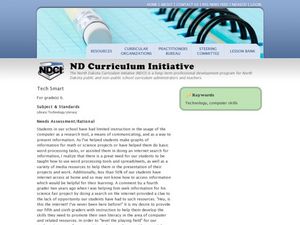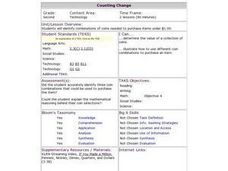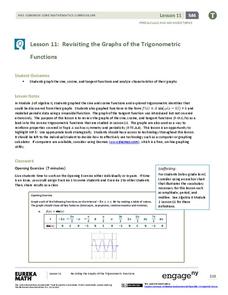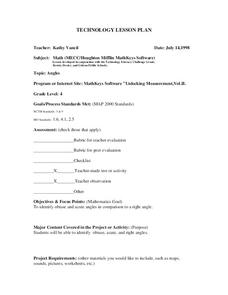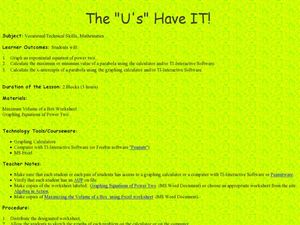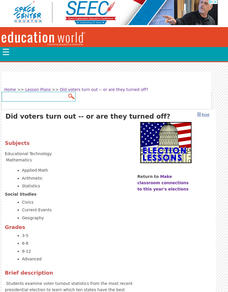Curated OER
Using Kid Pix
Second graders explore technology and its uses. They explore Kid Pix software and create pictures displaying their interests. They review their spelling list words and use Kid Pix to choose tools to demonstrate their words. They write...
Curated OER
Tech Smart
Sixth graders practice computer skills. In this technology lesson, 6th graders use programs such as Microsoft Word, Excel, Print Shop, and PowerPoint. They use the Internet for research and data collection to be incorporated in their...
Curated OER
Finding Remainders in Pascal's Triangle
Students use clock arithmetic to find remainders. In this patterns in math lesson, students explore the relationship between clock arithmetic and remainders using a computer applet. Students also identify patterns in Pascal's triangle...
Curated OER
Math Nutrition
Fifth graders use nutritional knowledge to plan balanced meals and use grocery store flyers to calculate costs of the meals. They create word problems using these flyers.
Curated OER
Technology Lesson Plan
Students measure various objects using non-standard units. The goal is for them to practice measuring in order to apply the physical act to various objects found in the classroom. The lesson is ideal for the kinesthetic learners and...
Curated OER
Flying High in Math
Seventh graders study how real airplanes fly and then they construct models of paper airplanes using design resources for the Internet and their own design. They use meaurement and caluculations in order to help them construct their...
Curated OER
Enhancing Writing Through Technology
Students participate in a class survey of their favorite activity to do in the snow and organize the results in a graph. They write a paragraph about the graph using language from a class-developed word web and include both an opening...
Curated OER
Math/Technology: Coin Combos
Second graders identify coin combinations needed to purchase items under a dollar. Using Kidspiration, they demonstrate three ways to purchase a pizza slice for 96 cents and choose an item which cost less than a dollar for other to...
Curated OER
Animal Skin
Students investigate the skin surface to body area ratios for different animals. In this seventh/eighth grade mathematics/science activity, students explore heat transfer between an animal’s body and the environment. Using...
Curated OER
Cross Cultural Transportation and Resources Exchange
Students examine various modes of transportation. They explore regional transportation options and discover options available in their area. Students survey types of transportation people use in their area. Using spreadsheet data,...
EngageNY
Revisiting the Graphs of the Trigonometric Functions
Use the graphs of the trigonometric functions to set the stage to inverse functions. The lesson reviews the graphs of the basic trigonometric functions and their transformations. Pupils use their knowledge of graphing functions to model...
Curated OER
Metrically Me!
Students define the parts of a database, search strategies to locate information electronically, create/modify databases, etc. and enter data into a prepared spreadsheet to perform calculations.
Curated OER
Angles
Learners identify obtuse and acute angles in comparsion to a right angle. They identify obtuse, acute, and right angles. Pupils use "Shape Measure" to construct obtuse, acute, and right angles. They review line segements to locate right...
Curated OER
Exploring Transformations
Young scholars explore what happens when geometric figures are transformed on the coordinate plane. They work in pairs, moving geometric shapes in the plane, and formalize their rules as functions.
Curated OER
Counting Coins
Second graders identify a quarter, dime, penny, nickel, and dime. They match the coin with it's monetary value, collect data on excel spreadsheet, and create a graph in Excel. Students participate in group activities.
Curated OER
The "U's" Have IT!
Students explore the maximum and minimum values of parabola. For this exponential equations lesson, students use graphing calculators or TI Interactive Software to calculate values of parabola and graph x-intercepts of parabola.
Curated OER
Did Voters Turn Out -- or Are They Turned Off?
What was the voter turnout at your last state election? Examine voter turnout statistics from the most recent election to learn which ten states have the best turnout record. This lesson plan offers election data, handouts, and worksheets.
Curated OER
A Picture is Worth a Thousand Words
Pupils create various types of graphs. They go to suggested websites to collect data and create graphs to organize the data. Then they answer questions according to their graph.
EngageNY
Making Fair Decisions
Life's not fair, but decisions can be. The 17th installment of a 21-part module teaches learners about fair decisions. They use simulations to develop strategies to make fair decisions.
Curated OER
Build Your Dream Bedroom
Designers measure their own rooms and produce a scale drawing. They use the Internet to visit sites to find the costs of purchasing new carpet, paint, or anything else they would like to add to their room. Using a $1500 budget, they will...
Alabama Learning Exchange
Jump! An Exploration into Parametric Equations
Explore parametric equations in this lesson, and learn how to determine how much time it takes for an object to fall compared with an object being launched. high scoolers will use parametric equations to follow the path of objects in...
Curated OER
Novel Character Study
Students complete a character study using a database to compile information from a novel. They design a five slide presentation highlighting the character's reaction to different situations in the book. They write an acrostic poem using...
Curated OER
"Who am I?"
Pupils of all ages work in pairs to find information about themselves and record a digital "Who am I?" They observe and measure each other, write clues, and illustrate before having others guess who is described.
Alabama Learning Exchange
Triangle Area: No Height? Use the Sine
No height? No problem! Learners use their knowledge and a little help from GeoGebra to develop the Law of Sines formula. The Law of Sines helps to determine the height of triangles to calculate the area.



